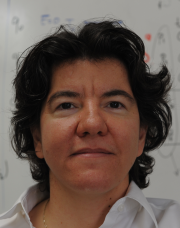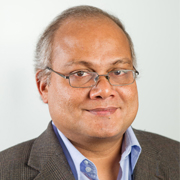Keynote Speaker 1:
Sennur Ulukus

Department of Electrical & Computer Engineering Institute for Systems Research, University of Maryland, USA
Title: Energy Harvesting in IoT Networks: Recent Results and Future Directions
Abstract: Internet of Things (IoT) is an important component of the upcoming 5G and further future generations of wireless networks. A crucial enabler for most IoT applications is an ability to replenish the energy of the devices conveniently and cost effectively. Energy harvesting and energy cooperation are promising technologies towards that goal. In this talk, I will summarize recent advances in energy harvesting communications and wireless energy transfer, and discuss some open problems for future research. The emphasis will be on real-time online power control, multi-node energy harvesting networks, and heating and temperature control issues for implanted energy harvesting devices.
Keynote Speaker 2:
Vincent Lau

Chair Professor, FIEEE, FHKIE, Department of Electronic & Computer Engineering Hong Kong University for Science and Technology, Hong Kong
Email: eeknlau@ee.ust.hk
URL: http://www.ee.ust.hk/~eeknlau
Title: Mission-Critical Control with Energy Harvesting Sensors
Abstract: Machine to machine (M2M) communication represents one important class of applications in future 5G wireless systems. The machine nodes are not necessarily targeted for content communications but rather, they are task-specific. In this talk, we consider the design and optimization of MIMO sensors for control-type applications (such as stabilization of large scale industrial plants). A potentially unstable MIMO dynamic plant is stabilized by means of a feedback controller via a multi-antenna energy-harvesting sensor connected to the remote controller via a MIMO wireless channel. The focus is to design a dynamic MIMO precoder at the sensor so as to stabilize the dynamic plant. MIMO precoding optimization has been widely studied in the areas of wireless communication and signal processing. However, these existing approaches are targeted for communication-specific applications and hence, they are not applicable to the networked control system where the objective is very different. In fact, the dynamic MIMO precoder targets for the stabilization task in the MIMO NCS should be adaptive to the wireless channel fading (which reveals the transmission opportunities), the energy availability (which reveals the dynamic resource available) as well as the state estimation error at the controller (which reveals the urgency of the transmission). This is a very challenging task as it embraces the information theory (to model the PHY dynamics), the queueing theory (to model the evolution of the energy queue) as well as the control theory (to model the stability of the dynamic plant). In this work, we propose a low complexity closed-form MIMO precoder solution by means of Lyapunov optimization techniques. Intuitively, we choose the MIMO precoder to maximize the negative Lyapunov drift to stabilize the MIMO NCS. We also derive the required communication resources (such as the renewable energy arrival rate, the battery capacity at the sensor) needed to achieve the stabilization of the MIMO NCS. The proposed scheme is also shown to outperform various state-of-the-art MIMO precoding solutions.
Keynote Speaker 2:
Arumugam Nallanathan

Centre for Telecommunications Research King's College London, United Kingdom
Title: Energy Harvesting in Wireless Networks: Challenges, Opportunities and Research Trends
Abstract: Energy harvesting is an effective means to prolong the life of a wireless network, and has recently received remarkable attention since it is increasingly contributing to green communication. With the recent advancements in the technology of low power devices (e.g. efficient DC-DC convertors and antenna rectifiers), it has been shown that ambient radio-frequency (RF) signals is a new promising source for harvesting energy and is expected to be implemented in low power networks in near future. The motivation behind this approach lies in the fact that most devices are surrounded by RF signals, and potentially, energy and information can be carried together by the RF signals during transmission. This talk is focused on exploiting the wireless power networks, with an emphasis on investigating the joint optimal energy and information beamforming designs as well as multiple antenna signal processing in cooperative networks. This talk also points out the some effective methods of tackling the emerging security issues in wireless powered networks. Moreover, the novel non-orthogonal multiple access schemes for wireless powered networks are also underlined. Finally, some promising open research directions are provided in context of wireless powered networks.